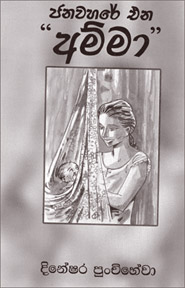Amma!
 A decade ago, or maybe a little longer, Sri Lanka hadn’t heard of a
‘Father’s Day’ or a ‘Mother’s Day’. Perhaps it is because I belong to a
different generation that I have what I believe is a healthy suspicion
of such ‘days’. A decade ago, or maybe a little longer, Sri Lanka hadn’t heard of a
‘Father’s Day’ or a ‘Mother’s Day’. Perhaps it is because I belong to a
different generation that I have what I believe is a healthy suspicion
of such ‘days’.
A few years ago, when I was working at the The Nation, a young girl
in charge of the youth section of the paper, ‘Soul’, in lining up
possible topics for the weeks ahead, had penciled in ‘Father’s Day’. I
supposed that given the target audience of the paper and the section, it
was a defensible proposition. I didn’t give it any further thought until
a couple of weeks later.
It was around 4.30 am. I had spent the previous night in the drivers’
quarters since we had to leave early on a two-day trip along the A-4
with a couple of other journalists. Lakshman, our driver, had washed the
van and got it ready for the journey. When I got into the vehicle I
found him placing some flowers on the dashboard, before a small image of
our Budunwahanse.
Expressing gratitude
‘I am going to recite the gathas; I hope you don’t mind,’ he said in
Sinhala. I didn’t mind.
And so Lakshman, even as he drove, recited the namaskaaraya,
reiterated convictions about the Buddha, Dhamma and Sangha, murmured the
incomparable qualities of the trinity and offered merit to the gods and
the dead. Expected.
 ‘Dasamaase urekatva...poseseeuddikaaranang...aayudeegang
vassasathang...maathu paadang namaamahang,’ he went on, followed by the
gatha devoted to expressing gratitude to and veneration of the father. ‘Dasamaase urekatva...poseseeuddikaaranang...aayudeegang
vassasathang...maathu paadang namaamahang,’ he went on, followed by the
gatha devoted to expressing gratitude to and veneration of the father.
Lakshman belongs to my generation. I realized, as I listened to him,
that ‘Mother’s Day’ was not about generation, and that it did not
necessarily speak of an either-or reality. Even those who get caught up
in the crass commercialism of such ‘days’, do recognize the centrality
of ‘mother’ in their universe even if they do not articulate this fact
in the uttering of this gatha and, when possible, the physical act of
touching feet in veneration, i.e. if the particular person is not a
Buddhist.
Last afternoon, I ran into a friend who had a book in his hand.
Janavahareena ‘amma’, is a slim volume that speaks of the many, many
references to ‘Amma’ or ‘mother’ in Sinhala folk traditions, including
colloquialisms and literature. The author, Dineshara Punchihewa it so
happened was with my friend. He had extra copies.
Folk poetry
It is a fascinating collection of verses, references and narratives.
Most of the janakavi or folk poetry was new to me, but not so the
numerous contexts in which the term ‘amma’ is used. It is something we
hear all the time and perhaps for this reason do not reflect enough
about. ‘Amma’ figures a lot in the traditions of deity-worshipping.
Punchihewa gives what must be an incomplete but still quite impressive
list of deities whose names have the Amma-tag.
They seem to be, for the most part, referring to real people whose
exemplary qualities or stature warranted deification after death.
He classes them as ‘Kiri-ammadevathaviyo’, or grandmother
goddesses/deities, and suggests that the practices derive from or are
associated with the worshipping of Goddess Pattini, Pattini Amma. The
social, cultural and religious significance, the derivation of relevant
cosmologies and the mapping of social processes is a matter for
Anthropologists. I, as layman, was duly impressed by the spatial spread
of ‘Amma-ness’ if you will and the fascinating diversity of character
and socio-religious function.
The status and worth accorded to Amma is clearly apparent by the
widely known epithet ‘Gedara budun amma’ (Mother is the Buddha of the
Household), i.e. the most compassionate, most giving, most kind, most
understanding, most forgiving and the wisest. I remembered two songs. I
remembered Victor Ratnayake’s, ‘Aaradaye ulpatha vu amma’ (Mother, the
original spring of love; ‘Mother’ of course being a poor translation of
‘Amma’, perhaps because of inevitable cultural preferences) and a
different kind of valuation, if you will, in Karunaratne Divulgane’s
‘Kala wewe nil diyavara’.
Divulgane says that there is a sun that arrives in the kitchen long
before its rays touches the village: Amma. It is this light that births
buds of wisdom, he continues.
This is what fragrances the earth and this is why he can say that
‘Amma’ is equivalent to the blue waters of the Kala Wewa, an equivalency
whose worth best understood by those who know water, wewa and a
particular philosophical bent in the matter of creating a civilization.
Long life
I remembered Lakshman and that pre-dawn chanting too of course, and
how Amma is ever present and ever worthy of worship.
‘For having carried me in your womb for close to ten months, for
having fed me and cared for me so I could live for a hundred years, I
touch your feet and worship, and I wish you a long life.’
My mother is no more. I remember touching her feet and reciting this
gatha every night. I remember not knowing what it meant until I was
around 12 years old. I remember that in that ignorance silently
transferring all merit I may have acquired so she lives forever. I’ve
lamented many times that perhaps I was not good enough, and so my giving
was poor. Perhaps she didn’t need it, for she is immortal. To me, at
least. I certainly would not devalue her with a card and a day.
[email protected]
|



